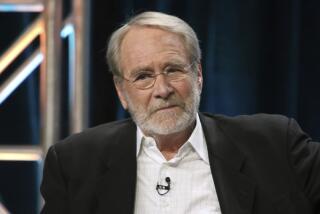On the Road to World Health
- Share via
He had just arrived home from Mexico an hour before I got there, a trip he makes at least once a month and frequently much more often. He had left by car on Thursday afternoon after three 12-hour days of seeing to his Orange County practice.
Along with a pediatrician associate and a visiting nurse (usually several UC Irvine medical students go along, as well), he had spent the weekend running a medical clinic for an obscure band of Mexican Indians near Ensenada who basically have no other health care. Tomorrow he would be meeting his local patients again.
A normal week in the life of Dr. Dennis Mull.
If he was fatigued by this regimen, he certainly didn’t show it on this Sunday night. At 50, a round-faced, slightly rotund man with warm, ingenuous eyes behind rimless glasses, Mull manages to combine a kind of favorite-uncle kindliness with a powerful sense that he knows what he is talking about--and believes in it.
“Besides the clinic for the Indians,” he says, “we have two other ongoing projects in Mexico: a weight program for children outside Tijuana to see if they are properly nourished, and a program to limit the spread of AIDS on the Mexican side of the border.”
Medical students have been especially helpful with the latter program. AIDS, says Mull, is mostly brought to Mexico from the United States and transmitted through Mexican prostitutes. Since prostitution is a flourishing industry in Mexico, the dangers are high. Mull’s medical students are interviewing prostitutes, trying to discover local attitudes and practices to permit more effective preventive treatment. It is a technique that Mull helped pioneer, then developed for attacking health problems in Third World countries.
His partner in that effort is his wife, Dorothy, who stayed home on this weekend. A tall, articulate, self-assured woman, she holds a doctorate in English and was a specialist in Shakespeare until she turned to anthropology a decade ago so she could study the social aspects of medicine in tandem with her husband.
They live in a tract home in Irvine with their three children: Brenden, 14, Justin, 11, and Ashley, 9. The house, decorated with artifacts from their extended trips to Saudi Arabia, Pakistan and Latin America, reflects their priorities. Its focal point is the word processor console in the breakfast room, where Dorothy works on the papers summarizing their research. “We haven’t totally moved in yet,” she explains, “since we got back from Pakistan.”
That was several months ago--a year’s sabbatical that turned into a two-year tour of duty (the second one unpaid). The objective: establishing a public-health program at a new university hospital in Karachi and doing extensive anthropological research. Says Mull: “We have to know what health behaviors are in a community before we can know the nature of the problem--and find the best route to change.”
He brandished a tiny packet that was labeled “Oral Rehydration Salts.” “This costs 3 or 4 cents to make,” he said. “Yet it could cut down dramatically on the 5 million kids who die every year of diarrhea in Third World countries--300,000 in Pakistan alone. But that knowledge is almost useless unless we first learn what mothers think and do about diarrhea before we start a health campaign to advance the use of oral rehydration therapy.”
He must have made that point dramatically in Karachi. Shortly after Mull returned home, Ray Martin, chief of health population and nutrition for the U.S. mission to Pakistan, wrote him: “There is a tendency from program managers to think they know what and how people think and how best to implement training and communication programs. Your research may well challenge some of the conventional wisdom and lead to more effective programs.”
Dennis Mull didn’t arrive at that point either quickly or by a conventional route. He was raised in Clinton, Iowa, the son of a sales executive who moved frequently. As a Harvard undergraduate, Mull’s interest in writing influenced him to major in English; he switched to premed “because I thought it would be a gratifying experience. But it was always the social side of medicine that interested me.”
He had finished medical school and was interning in Richmond, Va., when the Army sent him to Vietnam. That is where he began to form his views on anthropological medicine. He was assigned to help Vietnamese civilians in a clinic in the interior of northern Vietnam that was frequently under fire. “When I first went there,” he says, “I thought (the war) was something we had to do, but when I saw the people I was treating getting kicked around by both sides, I grew to believe that it was a big mistake.”
During the Tet offensive, Mull’s clinic came under attack, and one of his medical corpsmen was killed by a sniper. Mull wrote a touching letter to the man’s family and received a grateful answer from the man’s sister. Her name was Dorothy Sipe, and she was an English professor at the University of Wisconsin.
Mull was so taken with her letter that he responded immediately. Dorothy says he sent a picture; he doesn’t remember that. “I thought he was an old man,” she recalls, “because my brother had spoken so respectfully of him, so I was just trying to be nice.”
Six months later, Mull came home and immediately went to see Dorothy Sipe. They were married three weeks later--and earlier this month celebrated their 20th anniversary.
Mull returned to Harvard to study public health, and after six months of “excessive airplane bills,” Dorothy quit her job in Wisconsin and found similar work at the University of Massachusetts. “I guess,” says Dennis Mull mildly, “that in general she has deferred her career to me.”
The couple embarked on their present track in 1974 when they moved to Saudi Arabia, where Mull became the director of preventive medicine at a new teaching hospital in Jiddah. Dorothy taught English there, “but I also began to develop an interest in anthropology, especially as it related to medical research.” Although the Mulls liked it in Saudi Arabia, “the handwriting was clear that as soon as possible all the top jobs would go to Saudis.” So in 1976, the Mulls returned to the United States and Dennis accepted an appointment as vice chairman of the department of family medicine at UCI.
Neither of them had ever lived or even visited extensively in Southern California, “but the thing that really sold me,” says Mull today, “was the clinic in Santa Ana.” Within a year, Mull--in addition to his teaching duties--became director of UCI’s Community Clinic, and since devoted a large share of his time to working with patients there.
It was a rich area in which to mine the social aspects of medical care. Mull and his student researchers, for example, discovered through interviews with patients that Latinos believe that they should get better in three days or should get another doctor, regardless of the problem. This explained why patients were inexplicably going out the door and enabled doctors to counter this attitude by explaining the type and nature of treatment required up front.
Given the research bent of the Mulls, it was also natural for them to work backward from this knowledge to discover the origins of these beliefs. That took the Mull family--with kids and camper--to a remote area of the Mexican Sierra Madre to provide health care and study the Tarahumara Indians for five summer vacations. It also led to such adventures as winning the confidence of, and then interviewing at length, professional folk healers to whom Mexicans in large numbers turn for health care.
By this time, Dorothy Mull was totally hooked. “I had decided I didn’t want to teach English anymore. I felt I could make more of a contribution as an anthropologist in support of Dennis’ work by breaking down barriers for people who can’t articulate their thoughts.”
Since that time, the Mulls have worked as a team, enjoying growing stature in the professional community, where their research has been reported in numerous journals, both medical and anthropological. “Very little of this sort of combination has been done before,” says Dennis Mull, “but it is now growing. That growth has been helped by the awareness that answers to health problems--especially in Third World countries--is frequently not high-tech medicine but behavior modification.”
This research produces a great deal more satisfaction than income. (“To work in international health,” says Dennis Mull wryly, “you have to decide that money is not a top priority.”) Frequently, it depletes income. On his last two visits to Mexico, for example, Mull was told that there was no medication available when he tried to get Indian patients admitted to a nearby hospital. So he bought it, himself.
Mull spends three long days each week teaching at UCI and seeing patients in his private practice. He spends up to a day and a half at the Santa Ana Community Clinic. “And the rest of the time, I put on my research hat and work on my Pakistani data or go to Mexico. I like,” he says simply, “working with poor people.”
More to Read
Sign up for Essential California
The most important California stories and recommendations in your inbox every morning.
You may occasionally receive promotional content from the Los Angeles Times.













